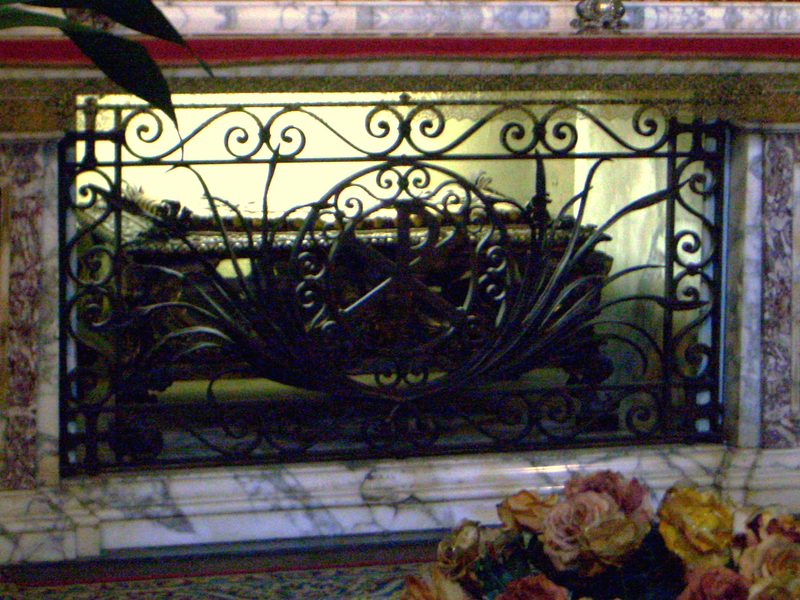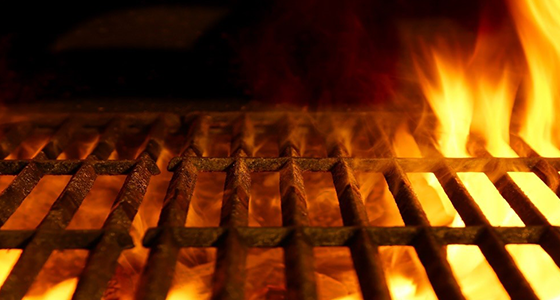We know very little about his life. He is one of those whose martyrdom made a deep and lasting impression on the early Church. Celebration of his feast day spread rapidly.
He was a Roman deacon under Pope St. Sixtus II, whose demise we learned about a few days ago (Aug 7). Three days after this pope was put to death, Lawrence and four more clerics also suffered martyrdom, during the persecution of the Emperor Valerian.
A well-known legend has persisted from earliest times. As a deacon in Rome, and as you may recall from Sts Timothy & Maura, deacons, in addition to their liturgical role, also typically each were assigned some practical matter to attend to: the discipline of the assembled congregation, keeping of books/scriptures (Timothy), or acting as treasurer for the local Church, etc..
Lawrence was charged with the responsibility for the material goods of the Church in Rome, and the distribution of alms to the poor. When Lawrence knew he would be arrested like the pope, and that the Emperor sought to extort, most likely by means of torture, the wealth of the Church. While he still had time, Lawrence gathered the wealth, liquidated it and then he sought out the poor, widows and orphans of Rome and gave them all the Church money he could get his hands on, selling even the sacred vessels with which the Mass is said to increase the sum.
The prefect of Rome imagined that the Christians must have considerable treasure. He sent for Lawrence and said, “You Christians say we are cruel to you, but that is not what I have in mind. I am told that your priests offer in gold, that the sacred blood is received in silver cups, that you have golden candlesticks at your evening services. Now, your doctrine says you must render to Caesar what is his. Bring these treasures—the emperor needs them to maintain his forces. God does not cause money to be counted: He brought none of it into the world with him—only words. Give me the money, therefore, and be rich in words.”
Lawrence replied that the Church was indeed rich. “I will show you a great treasure. But give me time to set everything in order and make an inventory.” Lawrence did take three days to liquidate the treasures of the church and give them to the poor. In the same three days Lawrence gathered a great number of blind, lame, maimed, leprous, orphaned and widowed persons and put them in rows. When the prefect of Rome arrived, Lawrence simply said, “These are the treasure of the Church.”
The prefect was so angry he told Lawrence that he would indeed have his wish to die—but it would be by inches. He had a great gridiron prepared, with coals beneath it, and had Lawrence’s body placed on it. After the martyr had suffered in agony for a long time, the legend concludes, he made his famous cheerful remark, “I am well done on this side. Turn me over!”

-Lawrence before Valerianus, fresco, 1447-1450, Fra Angelico, (1395-1455), Pinacoteca Vaticana

-The shrine in Rome containing the gridiron said to have been used to grill Saint Lawrence to death
Lawrence’s remains were buried in the cemetery of Saint Cyriaca on the road to Tivoli, Italy; tomb was opened by Pelagius to inter the body of Saint Stephen the Martyr; his mummified head removed to the Quirinal Chapel; the gridiron believed to have been his deathbed is in San Lorenzo in Lucina; garments in Our Lady’s Chapel in the Lateran Palace.
According to Christian legend, the Holy Grail is a relic that was sent by St. Lawrence to his parents in Spain as part of his dispersal of the Church’s treasure. While the Holy Chalice’s exact journey through the centuries is disputed, it is generally accepted by Catholics that the Chalice was sent by his family to a monastery for preservation and veneration. Historical records indicate that this chalice has been venerated and preserved by a number of monks and monasteries through the ages. Today the Holy Grail is venerated in a special chapel in the Catholic Cathedral of Valencia, Spain, in the region of St. Lawrence’s birth and early life.
“Sheltered under the name of Jesus Christ, I do not fear these pains, for they do not last long.”
-St. Lawrence
With the robe of joyfulness, alleluia,
Our Lord has this day clothed His soldier, Lawrence.
May Your faithfuls’ joyous assembly clap their hands
More cheerfully than they have before.
Today the noble martyr offered pleasing sacrifice to God,
Today he, being cruelly tested,
Endured unto the end the torment of fire;
And shrank not from offering his limbs to punishments most cruel.
Before the ruler he is summoned,
And settlement is made upon the Church’s hidden holdings.
But he is unmoved by enticing words, and is unshaken
By the torments of the ruler’s avarice.
Valerian is laughed to scorn,
And the deacon’s liberal hand,
When he is asked for payments,
Gave the gathered poor.
For he was their minister of charity,
Giving them abundance from his means.
Therefore the prefect is enraged,
And a glowing bed made ready.
The torment-bearing instrument,
The gridiron of his suffering,
Roasted his very flesh,
But he laughed it to scorn.
The martyr sweats in his agony,
In hopes of crown and recompense
Which is allotted those with faith,
Who struggle for the sake of Christ.
The court of heaven rejoices
For his warfare-waging,
For he has prevailed this day
Against the lackeys of wickedness.
That we, then, may attain the gift of life,
By this our patron, be glad, O our choir,
Singing in the church upon his feast-day
A joyful alleluia.
–from the Mass of Saint Lawrence, Old Sarum Rite Missal, 1998, Saint Hilarion Press
“The fire that burned outside was less keen than that which blazed within.” – Pope St Leo the Great
Love,
Matthew



